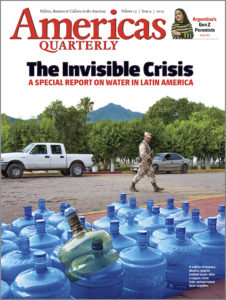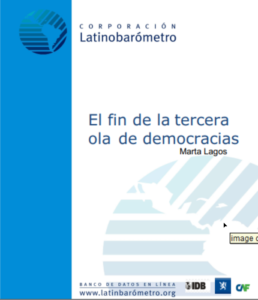 Can Latin America’s elected civilian leaders regain the trust of their publics and deliver on the promises of democratic governance? Can militaries escape the pressures of stepping into power during pronounced periods of political instability? ask analysts Frank Mora and Brian Fonseca, director of Florida International University’s Kimberly Green Latin American and Caribbean Center, and Brian Fonseca, director of FIU’s Gordon Institute for Public Policy, respectively.
Can Latin America’s elected civilian leaders regain the trust of their publics and deliver on the promises of democratic governance? Can militaries escape the pressures of stepping into power during pronounced periods of political instability? ask analysts Frank Mora and Brian Fonseca, director of Florida International University’s Kimberly Green Latin American and Caribbean Center, and Brian Fonseca, director of FIU’s Gordon Institute for Public Policy, respectively.
There are two types of civil-military relations that have to different degrees incorporated the armed forces into politics and governance, they write for Americas Quarterly:
- The first is the revolutionary model, as in Cuba, Nicaragua and Venezuela, where the armed forces are fully involved in most aspects of governance and the economy. They are the bulwark of the regimes, the most trusted and capable institution, committed to the survival of the revolutionary governments. As a result, the armed forces are entrusted to manage strategic sectors of the economy, head government ministries, and even serve as provincial governors, as in the case of Venezuela. Whether for ideology or cooption/corruption, it is very unlikely these militaries will divorce themselves from their current roles.
 The other more recent and subtle form of military involvement in politics is the consultative variant where, as in Guatemala and Brazil, very influential retired senior military officers play a critical role advising the president and other civilian political leaders as well as populating senior positions in government ministries, including as ministers…
The other more recent and subtle form of military involvement in politics is the consultative variant where, as in Guatemala and Brazil, very influential retired senior military officers play a critical role advising the president and other civilian political leaders as well as populating senior positions in government ministries, including as ministers…
In the last few years an inverse correlation has developed between the capacity and legitimacy of the region’s democratic institutions to meet society’s socio-political expectations and the use of the military to serve as a stopgap in support of ineffective civilian institutions. This does not mean that militarism is returning to Latin America, for now, they add. However…
…if democratic governance and democratically elected civilian leaders continue to fail to meet the expectations of its citizens, then it could leave the door open for military leaders to drag their institutions back into power for long periods. In fact, according to 2018/19 polling conducted by Americas Barometer, the average public support for military coups in Latin America sits at about 39% if responding to high crime and 37% in responding to high corruption. Militaries clearly prefer to stay on the sidelines, but they are also not blind to public opinion. RTWT
In Ecuador in 2000, Venezuela in 2002, Honduras in 2009, and more recently in Bolivia, opposition groups applauded when the army stepped in to remove elected governments they viewed as inept, corrupt or a threat to democratic institutions, note political scientists Steven Levitsky* and
*A contributor to the NED’s journal of Democracy.







